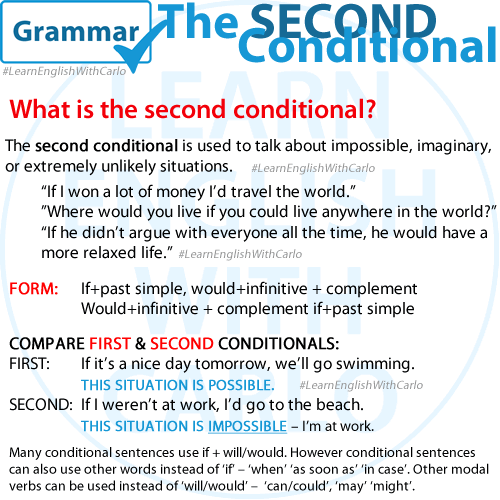What is the Second Conditional?
The Second Conditional is a grammatical structure used to talk about hypothetical, imaginary, or extremely unlikely situations. It allows us to express dreams, wishes, and scenarios that are not based in reality.
Structure
The Second Conditional follows this structure:
- If + past simple, would + base form of the verb
- Would + base form of the verb + if + past simple
Examples:
- If I won a lot of money, I’d travel the world. (Imagining winning a large sum of money)
- Where would you live if you could live anywhere in the world? (Imagining living in any location)
- If he didn’t argue with everyone all the time, he would have a more relaxed life. (Imagining a more peaceful existence)
Compare First & Second Conditionals
It’s important to distinguish between the First and Second Conditionals:
- First Conditional: Used for real and possible situations.
If it’s a nice day tomorrow, we’ll go swimming. (This situation is possible.) - Second Conditional: Used for unreal or impossible situations.
If I weren’t at work, I’d go to the beach. (This situation is impossible since I am at work.)
Using Other Words
Many conditional sentences use “if,” but other words can also be used to express conditions, such as:
- When
- As soon as
- In case
Additionally, other modal verbs can be used instead of “would” to express different meanings:
- Can/Could: If I could travel anywhere, I would visit Japan.
- May/Might: If I had more time, I might learn a new language.
Common Uses of the Second Conditional
- Dreams and Wishes: To express desires that are unlikely to happen.
- I wish I could fly. (Imagining the ability to fly)
- Advice: To give suggestions for hypothetical situations.
- If I were you, I’d take that job. (Imagining being in someone else’s position)
- Polite Requests: To make polite requests or offers.
- I would appreciate it if you could help me with this project. (Making a polite request)
Example Sentences
- If I were rich, I would donate to charity. (Imagining having wealth)
- You would have more friends if you were friendlier. (Imagining a different social outcome)
- If she knew his number, she would call him. (Imagining knowledge of his contact information)
Conclusion
The Second Conditional is a powerful tool for expressing our imaginations, dreams, and hypothetical situations. By mastering its structure and usage, you can enhance your conversational skills and express your thoughts more effectively in English.

FAQs About the Second Conditional
1. Can I use “were” instead of “was” in the Second Conditional?
Yes! In the Second Conditional, we typically use “were” for all subjects to express unreal situations:
- If I were you, I’d study harder.
2. Is it correct to say “If I was you”?
While some speakers use “was,” the standard form is “If I were you” when talking about hypothetical situations.
3. Can I use “might” in the Second Conditional?
Yes! You can use “might” to express a possibility instead of “would”:
- If I had more time, I might travel to Europe.
